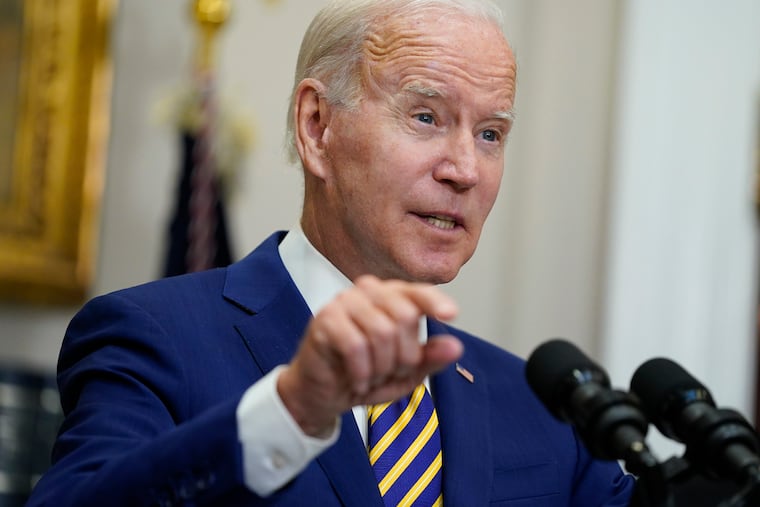Biden student loan forgiveness: Who’s eligible, what’s the income limit, and how will it work?
Everything you need to know about Biden's announcement on student loan debt cancellation.

Americans struggling to pay off their federal student loans will soon see some relief.
After months of speculation, President Joe Biden announced on Wednesday his administration is forgiving up to $10,000 of federal student loans per person, and $20,000 for anyone who received Pell Grants, which are awarded to students with low-income backgrounds. The move would come through an executive action, so Congress would not be involved, though that could be open to legal challenges.
The Biden administration also announced a final extension on a COVID-era pause on student loan payments from all borrowers through Dec. 31. Borrowers should plan to resume payments in January 2023, according to the Department of Education.
» READ MORE: What would Biden’s $10,000 student loan forgiveness mean for you? Tell us your story.
The move could help more than 43 million people who owe a combined $1.6 trillion in federal student debt. About 14 million people who owe less than $10,000 in federal student loans will see their debt fully canceled.
“This means that people can start to finally crawl out from under that mountain of debt to get on top of their rent and utilities,” Biden said during a news briefing Wednesday. “To finally think about buying a home or starting a family or starting a business.”
Here’s everything you need to know about Biden’s federal student loan forgiveness program:
How much student loan debt is being forgiven, and what’s the income limit?
The administration is canceling up to $10,000 in student loan debt on loans held by the Department of Education for borrowers who earn less than $125,000 a year, or married couples who earn less than $250,000 a year.
Borrowers who received a Pell Grant will be eligible for up to $20,000 in student loan debt cancellations. Biden told reporters 60% of all federal student debt holders, about 27 million people, are Pell Grant recipients.
» READ MORE: Biden announces long-awaited student debt forgiveness plan
Which student loans will be forgiven?
Though specific details have yet to be released, all types of federal student loans should be eligible for forgiveness, including the Pell Grant program, the William D. Ford Federal Direct Loan Program, the Federal Perkins Loan Program, and the Federal Family Education Loan Program. Grad and Parent PLUS loans should also be eligible, as will federal loans owned by private companies.
The Department of Education says there are two ways to determine if your student loan is federally or privately held:
Check the top of your federal loan promissory notes, applications, and billing statements, which will state the name of the federal loan program at the top.
Log in to StudentAid.gov using your FSA ID and select “My Aid” under your name, which will display information on all federal loan and grant amounts.
How will the student loan forgiveness work?
The Department of Education said it will be announcing further details on how to claim the relief in the weeks ahead, including an online application eligible borrowers will be able to fill out.
Almost 8 million borrowers might be eligible to have their loans canceled immediately, because their income and repayment data are already available to the Department of Education.
Will private student loans be forgiven?
While borrowers with federal students loans held by private companies will be eligible for debt cancellation, private student loans aren’t eligible for debt forgiveness under Biden’s plan.
There are ways to save money on your private student loan. If you’re in the military, you can limit the interest rate on your loans while you’re on active duty thanks to the Servicemembers Civil Relief Act. You can also claim up to $2,500 in interest payments you make on your student loans, depending on your income level.
» READ MORE: Debt is bad for mental health. Relief from Biden’s student loan forgiveness could take time.
What if you paid off your loans during the payments pause?
If you’ve made payments on your federal student loans during the course of the repayment pause, you could get a refund. According to the Department of Education, any payments since March 13, 2020, are eligible to be refunded, even if they were taken out automatically. To get one, the department advises that you contact your loan servicer and ask for a refund on the payments.
Will the move face any legal challenges?
Almost certainly.
Most Democrats have argued that the Higher Education Act of 1965 grants the president the right to cancel an unlimited amount of federal student loan debt. But not everyone agrees, including House Speaker Nancy Pelosi, who told reporters last year she believed the power rested solely with Congress.
“People think that the president of the United States has the power for debt forgiveness. He does not,” Pelosi said in a July 2021 news conference. “He can postpone. He can delay. But he does not have that power. That has to be an act of Congress.”
» READ MORE: Opinion | Biden’s student loan forgiveness is cause for celebration
The Department of Education published a legal memorandum justifying its authority to discharge federally-held student loan debt. The department’s office of general counsel cited several laws, including the HEROES Act, which, according to general counsel Lisa Brown, provides the department “broad authority to grant relief from student loan requirements.”
If any legal challenge of Biden’s authority to forgive federal student loans makes it to the Supreme Court, the conservative majority could overrule it as part of a recent pattern of limiting executive authority.
As Axios reported, the Supreme Court has recently prevented the CDC from enforcing a COVID-19 eviction moratorium, prevented OSHA from enforcing a COVID-19 vaccine mandate at workplaces, and stopped the Environmental Protection Agency from enforcing aggressive limits on greenhouse gases.
This article contains information from the Associated Press.